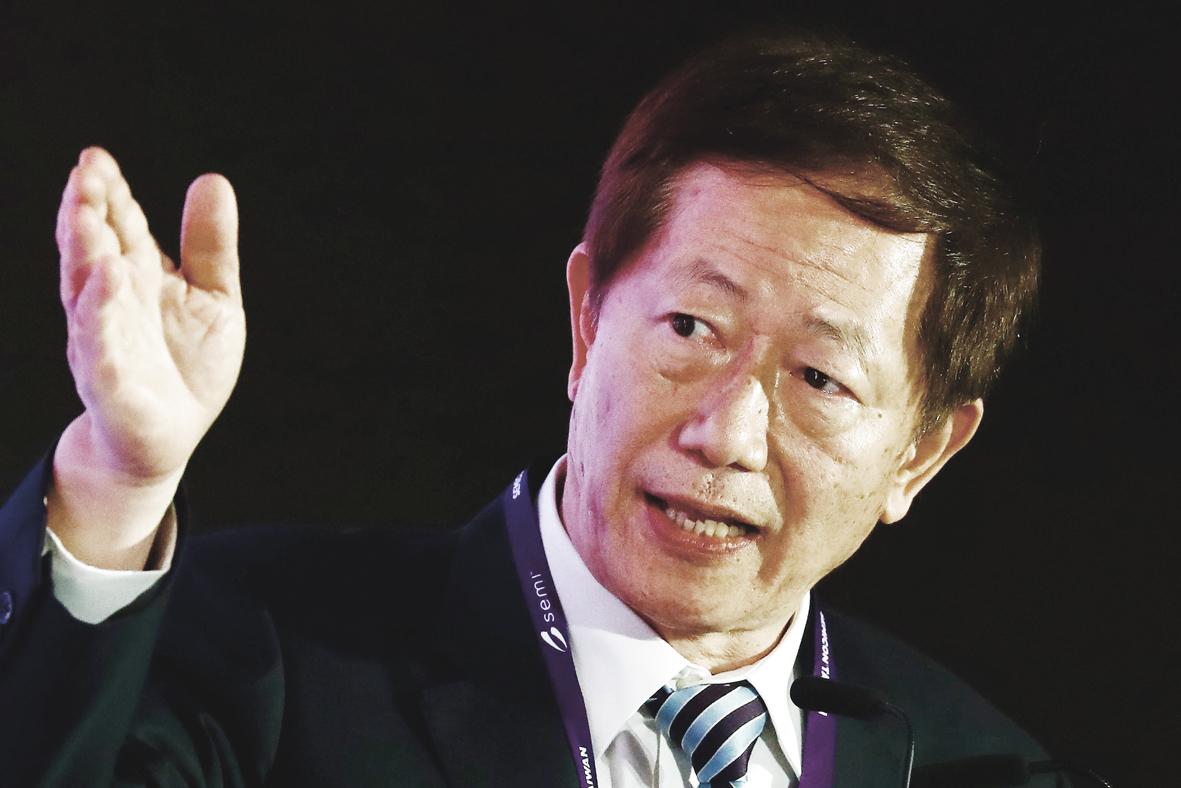Taiwan Semiconductor Manufacturing Co’s (TSMC, 台積電) shares fell 1.68 percent yesterday after the chipmaker warned about the risk of overcapacity with regards to less advanced semiconductor technology.
The world’s biggest contract chipmaker on Tuesday said that the COVID-19 pandemic and US-China trade tensions have led to “double booking” by clients amid mounting uncertainty over chip sourcing, which is part of the reason for the chip supply crunch.
The pandemic has disrupted supply chains and driven inventory stockpiling, and the supply of chips and other raw materials is unpredictable, TSMC chairman Mark Liu (劉德音) told reporters on the sidelines of the annual Taiwan Semiconductor Industry Association convention in Hsinchu.

Photo: Ritchie B. Tongo, EPA-EFE
Liu used the severe shortage of 28-nanometer chips, mostly used in vehicles, as an example.
In reality, global 28-nanometer capacity surpasses market demand, he said.
The tight supply of 28-nanometer chips is actually a problem of allocation, which cannot be resolved by expanding capacity, he said.
TSMC would do its best to distinguish inventory from real demand, or urgent demand, before allocating its chip supply, he said.
Last year, 13 percent of TSMC’s revenue came from 28-nanometer chips, down from 16 percent a year earlier.
United Microelectronics Corp (UMC, 聯電) is more bullish about 28-nanometer chips.
Due to healthy customer demand, the company has said that it cannot find any spare capacity for almost all types of chips, including 28-nanometer chips.
UMC has said that it expects 28-nanometer chips to account for 25 percent of its revenue this year, compared with 14 percent last year.
Separately, TSMC said that its production was not affected by a substation malfunction at one of its 12-inch fabs in Hsinchu yesterday.
One subcontracted worker was hospitalized due to the incident as he had inhaled too much carbon dioxide, the company said.
TSMC shares closed at NT$587 in Taipei trading yesterday.
Over the past month, the stock has tumbled 3.14 percent, underperforming a 2.99 percent rise on the TAIEX over the same period.

TECH SECURITY: The deal assures that ‘some of the most sought-after technology on the planet’ returns to the US, US Secretary of Commerce Gina Raimondo said The administration of US President Joe Biden finalized its CHIPS Act incentive awards for Taiwan Semiconductor Manufacturing Co (TSMC, 台積電), marking a major milestone for a program meant to bring semiconductor production back to US soil. TSMC would get US$6.6 billion in grants as part of the contract, the US Department of Commerce said in a statement yesterday. Though the amount was disclosed earlier this year as part of a preliminary agreement, the deal is now legally binding — making it the first major CHIPS Act award to reach this stage. The chipmaker, which is also taking up to US$5 billion

CHANGING JAPAN: Nvidia-powered AI services over cellular networks ‘will result in an artificial intelligence grid that runs across Japan,’ Nvidia’s Jensen Huang said Softbank Group Corp would be the first to build a supercomputer with chips using Nvidia Corp’s new Blackwell design, a demonstration of the Japanese company’s ambitions to catch up on artificial intelligence (AI). The group’s telecom unit, Softbank Corp, plans to build Japan’s most powerful AI supercomputer to support local services, it said. That computer would be based on Nvidia’s DGX B200 product, which combines computer processors with so-called AI accelerator chips. A follow-up effort will feature Grace Blackwell, a more advanced version, the company said. The announcement indicates that Softbank Group, which until early 2019 owned 4.9 percent of Nvidia, has secured a

TRADE WAR: Tariffs should also apply to any goods that pass through the new Beijing-funded port in Chancay, Peru, an adviser to US president-elect Donald Trump said A veteran adviser to US president-elect Donald Trump is proposing that the 60 percent tariffs that Trump vowed to impose on Chinese goods also apply to goods from any country that pass through a new port that Beijing has built in Peru. The duties should apply to goods from China or countries in South America that pass through the new deep-water port Chancay, a town 60km north of Lima, said Mauricio Claver-Carone, an adviser to the Trump transition team who served as senior director for the western hemisphere on the White House National Security Council in his first administration. “Any product going

CARBON REDUCTION: ‘As a global leader in semiconductor manufacturing, we recognize our mission in environmental protection,’ TSMC executive Y.P. Chyn said Taiwan Semiconductor Manufacturing Co (TSMC, 台積電), the world’s biggest contract chipmaker, yesterday launched its first zero-waste center in Taichung to repurpose major manufacturing waste, which translates into savings of NT$1.5 billion (US$46 million) in environmental costs a year. The environmental cost savings include a carbon reduction benefit of 40,000 tonnes, equivalent to the carbon offset of over 110 Daan Forest Parks, the chipmaker said. The Taichung Zero Waste Manufacturing Center is part of the chipmaker’s greater efforts to reach its net zero emissions goal in 2050, aligning with the UN’s 12th Sustainable Development Goal. The center could reduce TSMC’s outsourced waste processing